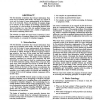Free Online Productivity Tools
i2Speak
i2Symbol
i2OCR
iTex2Img
iWeb2Print
iWeb2Shot
i2Type
iPdf2Split
iPdf2Merge
i2Bopomofo
i2Arabic
i2Style
i2Image
i2PDF
iLatex2Rtf
Sci2ools
125
click to vote
NAACL
1994
1994
Principles of Template Design
The functionality of systems that extract information from texts can be specified quite simply: the input is a stream of texts and the output is some representation of the information to be extracted. Hence, the problem of template design is an instance of the problem of knowledge representation. In particular, it is the problem of representing essential facts about situations in a way that can mediate between texts that describe those situations and a vaxiety of applications that involve reasoning about them. The research on which we report here is directed at elucidating principles of template design and at compiling these, with examples, in a manual for template designers.
Related Content
| Added | 02 Nov 2010 |
| Updated | 02 Nov 2010 |
| Type | Conference |
| Year | 1994 |
| Where | NAACL |
| Authors | Jerry R. Hobbs, David J. Israel |
Comments (0)

